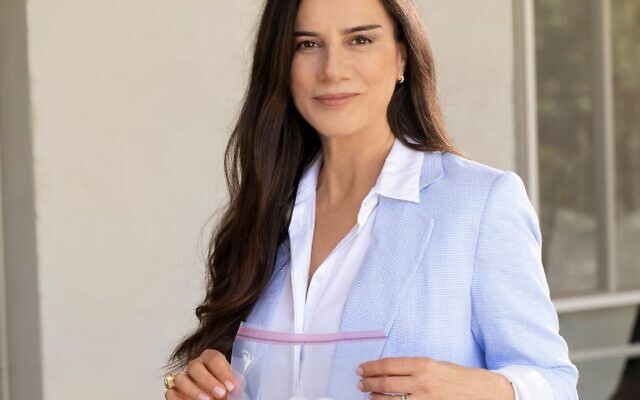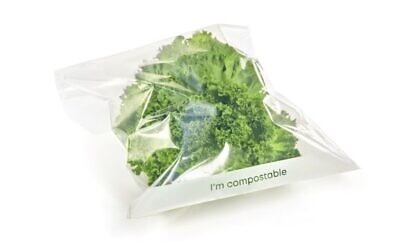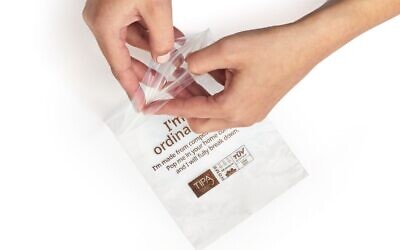Good things come in compostable packages
Daphna Nissenbaum, the co-founder of leading compostable packaging company TIPA, is calling on the UK government to support businesses in switching to compostable materials.

The co-founder of a pioneering packaging company is calling on the UK government to do more to support businesses in tackling plastic pollution
The government recently announced a ban on single-use plastic cutlery and plates as part of its war on plastic, but Daphna Nissenbaum, whose company TIPA makes compostable packaging as an alternative to plastic, says the government needs to actively encourage businesses, brands and retailers to switch to compostable materials.
Nissenbaum tells the Jewish News: “In the UK only 4 per cent of flexible packaging is recyclable, 96 per cent goes to landfill in the ocean. The government needs to encourage businesses and brands to use compostable packaging, by offering tax reductions and other incentives.” She adds: “At the moment, there is not enough voice or traction.
The government has a major role to play here in understanding that some materials have no viable end of life solution, lasting forever and damaging our resources.
“Of course, we need to package food, but the government can take a role, encouraging businesses, brands and retailers to use the right materials to pack food in, through offering incentives to companies who do so. They need to understand there is a solution – fresh produce can be packed in compostable packaging and then disintegrate with food to natural resources – and then encourage this.”
It is estimated that UK households throw away a staggering 100 billion pieces of plastic packaging a year, averaging 66 items per household per week. These are mainly food packaging items, such as snack bags and fruit and veg trays. Flexible comprises 25 per cent of all UK plastic packaging, while only 6% is currently recycled, meaning too much of it ends up in the environment.

Founded in 2010, TIPA manufactures compostable packaging that mimics the functionality and optical properties of plastic, but is biodegradable and does not adversely affect shelf life. It could even outperform conventional packaging when it comes to the shelf life of certain products.
Unsurprisingly, a growing number of brands, from food to fashion, are turning to TIPA’s solutions, as awareness over plastic pollution grows.
Among those TIPA is working with are Riverford, Scotch & Soda and Natoora.
Supermarket chain Waitrose recently launched its own brand compostable tea bags – the retailer’s Duchy tea bags are now accredited with a TUV OK compost HOME certification meaning shoppers can place them directly into a home compost bin or heap once used, while Tesco has announced that all its tea bags will be compostable by the summer – that’s more than one billion bags a year.
Last year TIPA teamed up with a selection of industry professionals as part of the Compostable Coalition UK; a 10 partner initiative aimed at assuring compostable packaging is effectively collected and organically recycled via existing UK bio-waste infrastructure. The Compostable Coalition UK: Closing the loop for compostable packaging project is backed by the UK Research & Innovation’s (UKRI) flagship Sustainable Plastic Packaging Challenge.
The UK government has said single-use plastic cutlery, plates and other items will be banned from October and replaced by biodegradable items as it attempts to tackle the country’s growing plastic waste problem. According to reports, around 1.1 billion single-use plates and 4.25 billion single-use cutlery items are used in England, with just 10 per cent being recycled once thrown away.
Disrupting the global plastics industry has long been on the agenda for Nissenbaum. After studying economics and computer science at the Bar-Ilan University, she pursued a career as a software engineer before changing direction and becoming CEO of the Caesarea Center for Risk Management. But the problem of plastic packaging was always on her mind.
“It started with a discussion I had with one of my kids about why he hadn’t returned his water bottle from school. I thought to myself that in a few years we will need packaging that is not based on plastic, because plastic is destroying the environment. The solution, I thought, should be simple, something that is already around us, a system that already works. I immediately thought of an orange peel. When I finish eating an orange, I throw away the residuals to the waste bin which disintegrates and biodegrades organically. Then it hit me! Why not create a package that can return to the organic waste stream? Like an orange peel, the package will decompose and go back to nature.”

Nissenbaum says an increasing number of companies are taking steps to green their business, with food and fashion being particularly early adopters. For the demand from consumers is there. “They really understand the need and would like to see more sectors using compostable solutions. It’s about pushing the brands and the regulators to take steps.”
She adds: “Sustainable brands and companies with a strong focus on the environment are becoming increasingly attractive to customers, employees, and investors. Having a good business reputation is more essential than ever and building a brand around sustainability shows the world you care about more than just your bottom line.”
www.tipa-corp.com/

Thank you for helping to make Jewish News the leading source of news and opinion for the UK Jewish community. Today we're asking for your invaluable help to continue putting our community first in everything we do.
For as little as £5 a month you can help sustain the vital work we do in celebrating and standing up for Jewish life in Britain.
Jewish News holds our community together and keeps us connected. Like a synagogue, it’s where people turn to feel part of something bigger. It also proudly shows the rest of Britain the vibrancy and rich culture of modern Jewish life.
You can make a quick and easy one-off or monthly contribution of £5, £10, £20 or any other sum you’re comfortable with.
100% of your donation will help us continue celebrating our community, in all its dynamic diversity...
Engaging
Being a community platform means so much more than producing a newspaper and website. One of our proudest roles is media partnering with our invaluable charities to amplify the outstanding work they do to help us all.
Celebrating
There’s no shortage of oys in the world but Jewish News takes every opportunity to celebrate the joys too, through projects like Night of Heroes, 40 Under 40 and other compelling countdowns that make the community kvell with pride.
Pioneering
In the first collaboration between media outlets from different faiths, Jewish News worked with British Muslim TV and Church Times to produce a list of young activists leading the way on interfaith understanding.
Campaigning
Royal Mail issued a stamp honouring Holocaust hero Sir Nicholas Winton after a Jewish News campaign attracted more than 100,000 backers. Jewish Newsalso produces special editions of the paper highlighting pressing issues including mental health and Holocaust remembrance.
Easy access
In an age when news is readily accessible, Jewish News provides high-quality content free online and offline, removing any financial barriers to connecting people.
Voice of our community to wider society
The Jewish News team regularly appears on TV, radio and on the pages of the national press to comment on stories about the Jewish community. Easy access to the paper on the streets of London also means Jewish News provides an invaluable window into the community for the country at large.
We hope you agree all this is worth preserving.





















